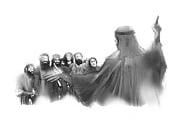The Crisis Continues – Teaching Plan
Key Thought : Knowing or not knowing God is reflected in practical ways in our lives. Where relational knowledge is lacking, idolatry sets in and brings a need of repentance.
The Crisis Continues, November 7-13, 2015
1. Have a volunteer read Jeremiah 10:10-15.

Image © Lars Justinen Goosalt.com
a. Ask class members to share a thought on what the most important point in this text is.
b. What does it mean to know God? Is it knowing the doctrines, knowing His Word, knowing He exists? Share..
c. Personal Application : What are some things, that if we are not careful, would come to trust more than we should? Share your thoughts.
d. Case Study : One of your relatives states: “Is it wrong to have statues, pictures, paintings of religious things? Are these idols, or just illustrations? How can we discern the difference?” How would you respond to your relative?
2. Have a volunteer read Jeremiah 26:1-6.
a. Ask class members to share a short thought on what the most important point is in this passage.
b. What does it mean when God told Jeremiah not to diminish a word?
c. Personal Application : What is the role of repentance in the Christian life? Are specific sins to be recognized and confessed, or can we just give a blanket “forgive me Lord for any sins I’ve committed”? Share your thoughts.
d. Case Study : One of your friends states, “What messages do we have that if directly spoken would others not like to hear? Why would we be reluctant to speak them?” How would you respond to your neighbor?
3. Have a volunteer read Jeremiah 26:10-15.
a. Ask class members to share a short thought on what the main idea of this text is.
b. What was the response to Jeremiah and his message?
c. Personal Application: When was the last time you had to stand faithfully for the truth as it is in Jesus? If you have never had to, why not? Is there something wrong? Share your thoughts.
d. Case Study : One of your neighbors states, “When would we need to stand up and call others to repentence? What might be some of the dangers involved in doing so?” How would you respond to your neighbor?
4. Have a volunteer read Jeremiah 26:16-24.
a. Ask class members to share a short thought on what the main idea of this text is.
b. How did Jeremiah escape death? Why did he put his life on the line?
c. Personal Application: What did it cost God to try and save rebellious humanity? Share your thoughts.
d. Case Study : Think of one person who needs to hear a message from this week’s lesson. Tell the class what you plan to do this week to share with them.
Note : “Truth that is not lived, that is not imparted, loses its life-giving power, its healing virtue. Its blessings can be retained only as it is shared.” Ministry of Healing, p. 148)
